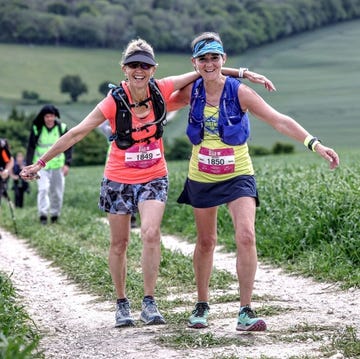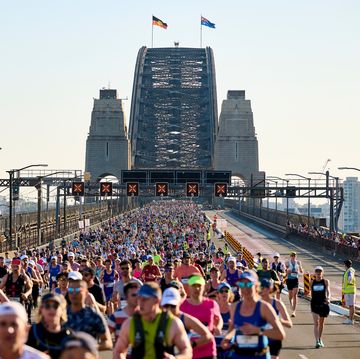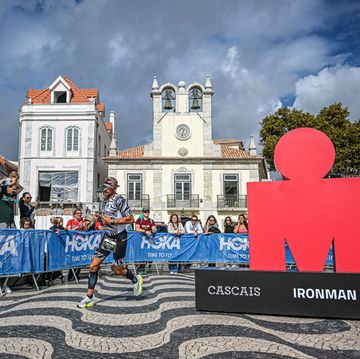Early on Sunday (2:45 a.m. EDT/8:45 a.m. local), a host of the world’s best marathoners – will take to the streets of Berlin with one thing on their mind: time.
That’s been the case at the Berlin Marathon for some years now. The athletes race not only each other for a prestigious title, but also run with one eye on the clock as they try to secure a personal best, a national record and often, a world record. The pancake-flat course, mild temperatures and team of professional pacers usually combine to tee up an opportunity like no other for elite athletes – and indeed the 40,000 other runners who will toe the line in the city’s Tiergarten on Sunday – to run fast.
It was in Berlin last year that Kenyan Wilson Kipsang blazed his way around 26.2 miles of the German capital to set the current world record of 2:03:23 (an average pace of 4:42 per mile). It was the sixth time the men’s marathon world record has been set in Berlin, and it will come as no surprise if it falls for a seventh time on Sunday.
On the women’s side, Paula Radcliffe’s world record of 2:15:25 remains out of reach, but that’s not to say we won’t see at least one national record on Sunday. Here’s what to look for.
Women’s Race: Flanagan vs. The Clock, and East Africa
Having become the fastest American woman ever at the Boston Marathon in April, courtesy of her 2:22:02 run for 7th place, Shalane Flanagan is now looking to become the fastest American woman marathoner, period.
Runners World Newswire Runner’s World Newswire last weekthat she chose Berlin – turning down far more lucrative offers from the American fall marathons – with one goal in mind: Deena Kastor’s American record of 2:19:36. “I am the fittest I have been in the marathon,” she said. “Everything has surpassed our expectations.”
As Berlin is a race where the elite women set off alongside the men, all female athletes are allowed to have their own male pacemakers. In Ryan Vail and Rob Watson, Flanagan has drafted in two elite marathoners who should lay down the perfect 5:19-per-mile pace that she requires to break Kastor’s record.
"I hope to run relatively the same as in Boston through halfway, probably closer to 69:40, but I’m hoping with the faster course that I can sustain that for the second half as well,” Flanagan said at Thursday’s pre-race press conference.
The weather in Berlin is forecast to be a sunny 60-65°F on Sunday morning. While not prohibitively warm, that’s still well above what most elite athletes would consider ideal for a record attempt.
The other question, of course, is whether Flanagan – record or no record – can win the race. In Feyse Tadese and Tirfi Tsegaye, she faces a pair of formidable Ethiopians. Tsegaye was runner-up in Berlin last year in a personal best of 2:21:19, while Tadese set her fastest time when winning the Paris marathon in 2:21:06 in April.
They have also indicated a willingness to run 2:19 this weekend, which means Flanagan – whose intention is to run solely for time, not place – is likely to have some company along for the ride.
Can she do it? The odds are undoubtedly stacked against her, but then again, she’s unlikely to find a better opportunity than this. She’s come to the right place to do it.
Men’s Race: Record Could Fall in Heavyweight Clash
It’s perhaps a bad analogy to label the stick-thin Kenyans Dennis Kimetto andEmmanuel Mutai as “heavyweights,” but few other terms seem appropriate to adequately describe their standing in the sport.
Kimetto, 30, is the fastest athlete in the race, boasting a personal best of 2:03:45 from his course-record win in Chicago last October. Mutai, meanwhile, is the more decorated of the two leading contenders; the 29-year-old won the London Marathon in 2011 and finished second there last year. In Chicago last year, he finished 7 seconds behind Kimetto, a margin he will feel capable of overturning on Sunday.
Though the Kimetto-Mutai rematch is an obvious narrative with which to frame Sunday’s race, it is also one which discounts the possibility of an upset, in the form of Ethiopia’s Tsegaye Kebede.
The 27-year-old was London Marathon champion last year, and though his personal best of 2:04:38 isn’t nearly as swift as that of his Kenyan rivals, he rarely runs a bad race, and can be relied upon to mix it at the front again on Sunday. Others to note include 22-year-old Geoffrey Kamworor (formerly Geoffrey Kipsang), who has finished third in the previous two editions of this race.
Whoever wins, one thing is for sure: the winning time will be fast. Kimetto has requested a world-record pace from race organizers, a sign perhaps that something special could be in the pipeline. Seeing whether he can beat the clock – and of course repel the challenges of Mutai, Kebede and company – will be a fascinating battle to watch unfold on the streets of the German capital.
It’s a race worth setting the alarm for.













